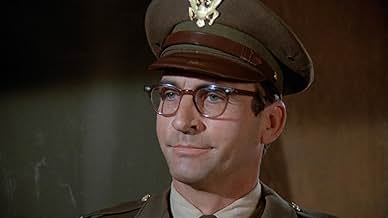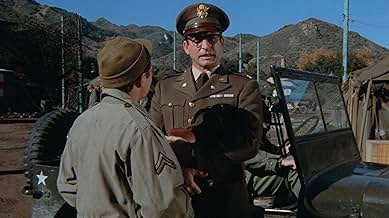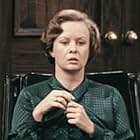Tuttle
- Episode aired Jan 14, 1973
- TV-PG
- 25m
IMDb RATING
8.9/10
1.3K
YOUR RATING
A little white lie about an imaginary officer balloons into an elaborate charade.A little white lie about an imaginary officer balloons into an elaborate charade.A little white lie about an imaginary officer balloons into an elaborate charade.
Mary-Robin Redd
- Sister Theresa
- (as Mary Robin Redd)
Gwen Farrell
- Nurse
- (uncredited)
Featured reviews
The MASH episode "Tuttle" is a masterclass in blending humor with humanity, delivering one of the series' most memorable and endearing tales. The story centers around the invention of a fictional officer, Captain Tuttle, conjured up by Hawkeye to reroute supplies and pay to a local orphanage. What begins as a simple prank spirals hilariously out of control as the entire camp-and eventually the military hierarchy-buys into the myth of this selfless and elusive hero. The writers skillfully escalate the absurdity while maintaining a tight, believable narrative thread, allowing viewers to laugh while being swept up in the story's clever twists.
What makes "Tuttle" truly special is how it underscores the show's core values beneath the laughter. Hawkeye and Trapper's mischief, though deceptive, is rooted in a deep compassion for the vulnerable, particularly the Korean orphans often overlooked in the chaos of war. As more characters join in on the lie, their motivations begin to reflect a collective yearning for hope and decency amidst the grim realities of their environment. Even Radar's innocent complicity and Frank Burns' predictable outrage add layers to the episode's moral complexity without losing the comedic tone.
By the time the camp stages Tuttle's tragic "death" with full military honors, the viewer is left grinning through a lump in the throat. The episode's final moments, with Hawkeye delivering a heartfelt eulogy to a man who never existed in the first place, perfectly captures MASHs unique ability to satirize bureaucracy while honoring genuine kindness. "Tuttle" is not only laugh-out-loud funny-it's a touching reminder that sometimes, the best way to make a difference is through a little imagination and a lot of heart.
What makes "Tuttle" truly special is how it underscores the show's core values beneath the laughter. Hawkeye and Trapper's mischief, though deceptive, is rooted in a deep compassion for the vulnerable, particularly the Korean orphans often overlooked in the chaos of war. As more characters join in on the lie, their motivations begin to reflect a collective yearning for hope and decency amidst the grim realities of their environment. Even Radar's innocent complicity and Frank Burns' predictable outrage add layers to the episode's moral complexity without losing the comedic tone.
By the time the camp stages Tuttle's tragic "death" with full military honors, the viewer is left grinning through a lump in the throat. The episode's final moments, with Hawkeye delivering a heartfelt eulogy to a man who never existed in the first place, perfectly captures MASHs unique ability to satirize bureaucracy while honoring genuine kindness. "Tuttle" is not only laugh-out-loud funny-it's a touching reminder that sometimes, the best way to make a difference is through a little imagination and a lot of heart.
This episode is a perfect example of how a comedic focused series with dramatic undertones should be written and acted out. An extremely witty storyline that provides perfect characterization to all of the series regulars. That character depth that is provided here is what's often missing in comedies. Any comedic tv writer should watch this episode to understand how to write a comedy.
I love this episode, and it is nicely played and executed, and probably close to a high point for the first season of the series. But let's give credit where it's due.
The story is derived from a 1928 novella by Yuri Tynyanov, based on a tale that was passed along from various sources across the 19th century -- the novella was filmed in 1932 under the title LIEUTENANT KIJE (also released as "The Tsar Wants to Sleep"), which included a very famous original score by Prokofiev, that has long outlived the recognition of the original movie (and was, in fact, re-purposed into the scoring of Alec Guinness film THE HORSE'S MOUTH and also Woody Allen's LOVE AND DEATH).
In the Tynyanov story, set during the short reign of Tsar Paul I, the monarch is awakened by noise from the cavorting of one of his officers with a lady-in-waiting to the court, and demands to know who is responsible. In order to shield the offender from the wrath of the tsar, the disturbance is blamed by the lady-in-waiting (whose shouts awakened the tsar) on a "Lieutenant Kije," who doesn't actually exist. But this being the 19th century military (Russian or anywhere else), no one wants to look foolish by admitting (especially to a subordinate) that they don't know this "Lieutenant Kije," and so the explanation is accepted -- "Kije" is ordered flogged and exiled, but there is no "Kije," of course. But the tsar changes his mind, and order "Kije" reinstated -- so now he has been created in the thinking of the tsar and takes on an existence administratively, and the officers have to keep coming up with diversions and other explanations for why "Kije" isn't present at this or that moment -- and neither their superiors nor their subordinates want to look foolish, and they go along with it. Meanwhile the "lieutenant's" reputation grows, along with his exploits. Finally, the tsar insists on having "Kije" serve him as part of his personal guard, and there seems to be no way around admitting the ruse.
And so it is announced -- that Kije died in battle, an honorable soldier to the end. And is buried with full military honors, mourned by the tsar and the entire court.
As Father Mulcahy once observed to Colonel Potter, when you've got good material, you can't miss. LOL.
The story is derived from a 1928 novella by Yuri Tynyanov, based on a tale that was passed along from various sources across the 19th century -- the novella was filmed in 1932 under the title LIEUTENANT KIJE (also released as "The Tsar Wants to Sleep"), which included a very famous original score by Prokofiev, that has long outlived the recognition of the original movie (and was, in fact, re-purposed into the scoring of Alec Guinness film THE HORSE'S MOUTH and also Woody Allen's LOVE AND DEATH).
In the Tynyanov story, set during the short reign of Tsar Paul I, the monarch is awakened by noise from the cavorting of one of his officers with a lady-in-waiting to the court, and demands to know who is responsible. In order to shield the offender from the wrath of the tsar, the disturbance is blamed by the lady-in-waiting (whose shouts awakened the tsar) on a "Lieutenant Kije," who doesn't actually exist. But this being the 19th century military (Russian or anywhere else), no one wants to look foolish by admitting (especially to a subordinate) that they don't know this "Lieutenant Kije," and so the explanation is accepted -- "Kije" is ordered flogged and exiled, but there is no "Kije," of course. But the tsar changes his mind, and order "Kije" reinstated -- so now he has been created in the thinking of the tsar and takes on an existence administratively, and the officers have to keep coming up with diversions and other explanations for why "Kije" isn't present at this or that moment -- and neither their superiors nor their subordinates want to look foolish, and they go along with it. Meanwhile the "lieutenant's" reputation grows, along with his exploits. Finally, the tsar insists on having "Kije" serve him as part of his personal guard, and there seems to be no way around admitting the ruse.
And so it is announced -- that Kije died in battle, an honorable soldier to the end. And is buried with full military honors, mourned by the tsar and the entire court.
As Father Mulcahy once observed to Colonel Potter, when you've got good material, you can't miss. LOL.
10jdollak
The first season of MASH struggles to find the right tone, and writers don't have the character history to rely on in making seriously emotional episodes. There are some very effective ones in the first season, even episodes before this one. But this is the episode where everything works perfectly for the first time. Aside from the very careful wordplay, there's an absurdist undercurrent. A fairly simple premise is built on, and spirals into a bigger production. It's wonderfully satisfying.
My favorite thing is a single, strange joke that Radar has, regarding his imaginary friend. One of the strangest things that the show ever did.
My favorite thing is a single, strange joke that Radar has, regarding his imaginary friend. One of the strangest things that the show ever did.
This is one of the Best episodes of MASH.
Hilarious and very well written!
Did you know
- TriviaThe episode is about a non-existing Captain Tuttle. The ending credit read: Captain Tuttle as Himself
- GoofsWhen General Clayton arrives, he salutes the camp personnel assembled before him and they return the salute, which is incorrect. When personnel are assembled in formation, the individual in charge should have called them to attention and then that individual alone would have given a salute on behalf of the entire formation.
- Quotes
Capt. Benjamin Franklin "Hawkeye" Pierce: We can all be comforted by the thought that he's not really gone, there's a little Tuttle left in all of us, in fact you might say that all of us together made up Tuttle.
- Crazy creditsThe fictive character "Captain Tuttle" whom we never see is, listed in the credits as "Himself".
- ConnectionsReferenced in Brazil (1985)
Details
- Runtime25 minutes
- Color
- Aspect ratio
- 1.33 : 1
- 4:3
Contribute to this page
Suggest an edit or add missing content


















